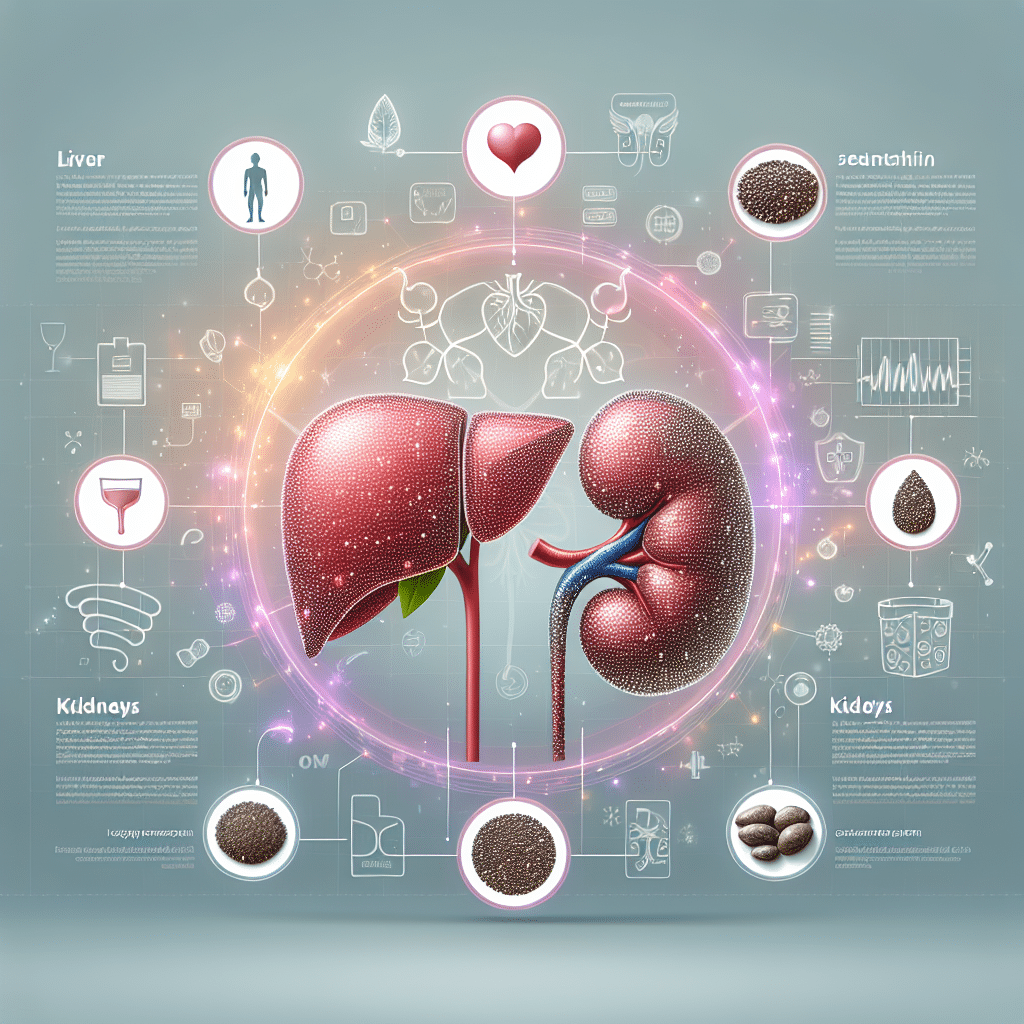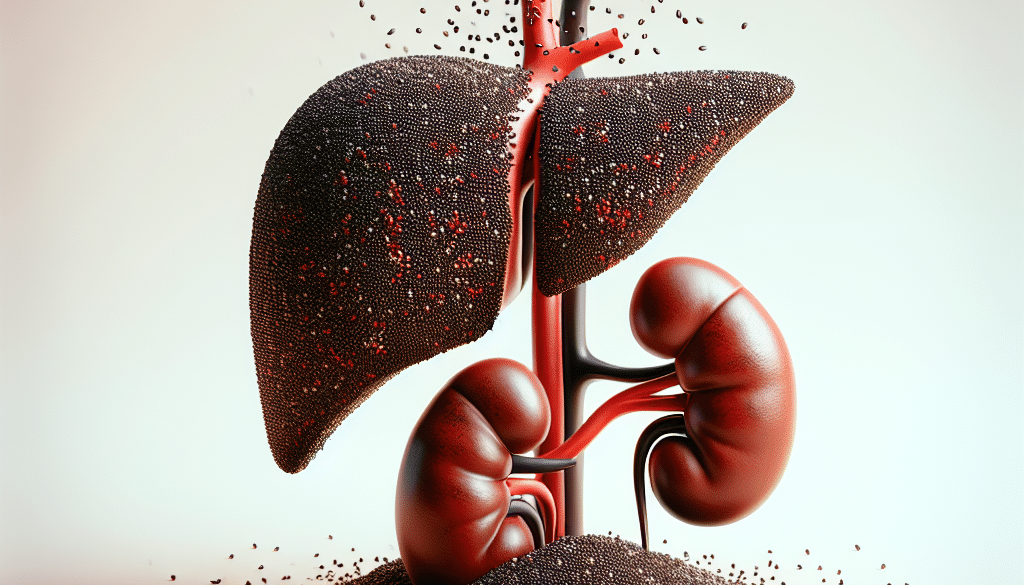Are Chia Seeds Good For Liver And Kidneys?
-
Table of Contents
- Chia Seeds for Liver and Kidney Health: A Nutritional Powerhouse
- The Nutritional Profile of Chia Seeds
- Chia Seeds and Liver Health
- Detoxification and Antioxidant Support
- Fatty Liver Disease and Omega-3 Fatty Acids
- Fiber’s Role in Liver Function
- Chia Seeds and Kidney Health
- Protein Quality and Kidney Function
- Mineral Balance and Electrolyte Regulation
- Hydration and Chia Seeds
- Case Studies and Research
- Precautions and Recommendations
- Conclusion: Chia Seeds as Part of a Healthy Diet
- Enhance Your Health with ETprotein’s Protein Products
Chia Seeds for Liver and Kidney Health: A Nutritional Powerhouse

Chia seeds have gained immense popularity in the health food world, and for good reason. These tiny seeds are packed with nutrients that can offer a multitude of health benefits. But when it comes to specific organs like the liver and kidneys, can chia seeds truly make a difference? This article delves into the potential benefits of chia seeds for liver and kidney health, supported by scientific research and expert opinions.
The Nutritional Profile of Chia Seeds
Before we explore the effects of chia seeds on the liver and kidneys, it’s important to understand their nutritional content. Chia seeds are rich in:
- Fiber
- Omega-3 fatty acids
- Protein
- Antioxidants
- Minerals such as calcium, magnesium, and phosphorus
These nutrients contribute to overall health and can specifically aid in the functioning of the liver and kidneys.
Chia Seeds and Liver Health
The liver is a vital organ responsible for detoxification, protein synthesis, and the production of biochemicals necessary for digestion. A healthy diet is crucial for maintaining liver health, and chia seeds may play a beneficial role.
Detoxification and Antioxidant Support
Chia seeds are a rich source of antioxidants, which help protect the liver from damage caused by free radicals. The antioxidants in chia seeds, such as quercetin, kaempferol, and myricetin, can reduce oxidative stress, potentially lowering the risk of liver diseases.
Fatty Liver Disease and Omega-3 Fatty Acids
Non-alcoholic fatty liver disease (NAFLD) is a common condition where fat accumulates in the liver. Omega-3 fatty acids, abundant in chia seeds, have been shown to reduce liver fat and inflammation in individuals with NAFLD.
Fiber’s Role in Liver Function
Dietary fiber, which chia seeds have in abundance, is known to aid in digestion and maintain a healthy weight. A study published in the European Journal of Clinical Nutrition found that increased fiber intake was associated with a lower risk of NAFLD.
Chia Seeds and Kidney Health
The kidneys are another crucial detoxifying organ, filtering waste products from the blood and excreting them in urine. Chia seeds may also support kidney health through their nutrient profile.
Protein Quality and Kidney Function
High-quality protein is essential for kidney health, especially for individuals with kidney disease. Chia seeds provide a complete protein, containing all nine essential amino acids, which is beneficial for those needing to manage their protein intake carefully.
Mineral Balance and Electrolyte Regulation
Chia seeds contain minerals like calcium and magnesium, which are important for electrolyte balance. Proper electrolyte balance is crucial for kidney function, as it helps regulate fluid levels in the body and maintains normal blood pressure.
Hydration and Chia Seeds
Chia seeds can absorb up to 12 times their weight in water, promoting hydration. Adequate hydration is essential for kidney health, as it helps the kidneys filter waste more effectively.
Case Studies and Research
While there is a wealth of anecdotal evidence supporting the health benefits of chia seeds, scientific research is still catching up. Some studies have shown promising results, such as a study in the Journal of Food Science and Technology that reported improved liver and kidney function in rats fed with chia seeds. However, more research, particularly in humans, is needed to fully understand the impact of chia seeds on liver and kidney health.
Precautions and Recommendations
Despite the potential benefits, it’s important to consume chia seeds in moderation. Excessive fiber intake can lead to gastrointestinal issues, and too much omega-3 can thin the blood. Individuals with existing liver or kidney conditions should consult with a healthcare provider before adding chia seeds to their diet.
Conclusion: Chia Seeds as Part of a Healthy Diet
In conclusion, chia seeds have a nutrient profile that suggests they could be beneficial for liver and kidney health. Their high antioxidant content, omega-3 fatty acids, quality protein, and fiber all contribute to the proper functioning of these organs. While more research is needed to confirm these benefits, incorporating chia seeds into a balanced diet can be a step towards better overall health.
Enhance Your Health with ETprotein’s Protein Products
If you’re looking to further support your liver and kidney health through diet, consider ETprotein’s range of high-quality protein products. Their organic, non-GMO, allergen-free proteins are an excellent addition to any health-conscious individual’s diet. Whether you’re looking for rice protein, pea protein, or other plant-based options, ETprotein has you covered. Their products are not only beneficial for your health but also for the environment, making them a responsible choice for your nutritional needs.
About ETprotein:
ETprotein, a reputable protein and L-(+)-Ergothioneine (EGT) Chinese factory manufacturer and supplier, is renowned for producing, stocking, exporting, and delivering the highest quality organic bulk vegan proteins and L-(+)-Ergothioneine. They include Organic rice protein, clear rice protein, pea protein, clear pea protein, watermelon seed protein, pumpkin seed protein, sunflower seed protein, mung bean protein, peanut protein, and L-(+)-Ergothioneine EGT Pharmaceutical grade, L-(+)-Ergothioneine EGT food grade, L-(+)-Ergothioneine EGT cosmetic grade, L-(+)-Ergothioneine EGT reference grade and L-(+)-Ergothioneine EGT standard. Their offerings, characterized by a neutral taste, non-GMO, allergen-free attributes, with L-(+)-Ergothioneine purity over 98%, 99%, cater to a diverse range of industries. They serve nutraceutical, pharmaceutical, cosmeceutical, veterinary, as well as food and beverage finished product distributors, traders, and manufacturers across Europe, USA, Canada, Australia, Thailand, Japan, Korea, Brazil, and Chile, among others.
ETprotein specialization includes exporting and delivering tailor-made protein powder and finished nutritional supplements. Their extensive product range covers sectors like Food and Beverage, Sports Nutrition, Weight Management, Dietary Supplements, Health and Wellness Products, and Infant Formula, ensuring comprehensive solutions to meet all your protein needs.
As a trusted company by leading global food and beverage brands and Fortune 500 companies, ETprotein reinforces China’s reputation in the global arena. For more information or to sample their products, please contact them and email sales(at)ETprotein.com today.












